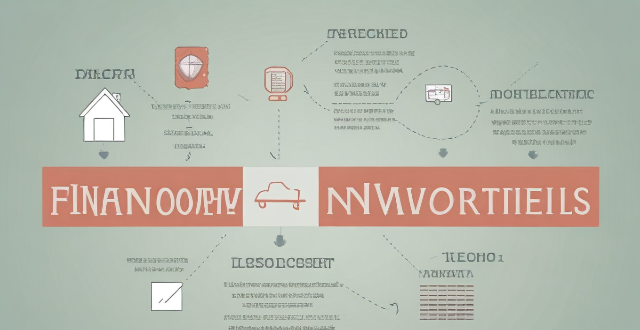Investment Return

What is the average return on investment for private equity ?
Private equity (PE) investments can offer attractive returns, but these are influenced by several factors. The success of the companies in which PE firms invest, market conditions, investment strategy, and timing all play a role. Historically, PE has delivered average annualized returns of 12-15%, though these can be volatile. It's important for investors to understand the J-curve effect, fees, and the benefits of diversification when considering PE investments.

Which financial product offers the highest return on investment ?
Investing in financial products is a popular way to grow wealth, but with many options, it's hard to determine which offers the highest return on investment (ROI). This article explores popular financial products and their potential returns. The stock market offers high potential returns but also significant risks. Real estate can provide rental income and property appreciation, but comes with its own set of risks. Mutual funds offer professional management and diversification, but fees and expenses can impact returns. Cryptocurrencies have gained popularity as an alternative investment option, but are highly volatile and speculative, making them unsuitable for most investors seeking stable returns. Determining which financial product offers the highest return on investment depends on various factors, including risk tolerance, investment goals, and market conditions. Diversification across different asset classes and investment vehicles can help minimize risks and maximize returns over time.

How do bond yields affect my investment returns ?
Bond yields significantly impact investment returns, particularly for bond and bond-related security investors. Yields represent the interest rate paid by bond issuers to holders and are crucial for expected returns. Higher yields generally result in increased interest income but can also cause price volatility. Inflation affects real returns, and lower yields may increase opportunity costs. Strategies like diversification, duration management, active management, and staying informed can help maximize returns amidst changing bond yield environments.

What are the tax implications of receiving venture capital investment ?
Receiving venture capital investment can have significant tax implications for a startup company, including the treatment of investment proceeds as ordinary income and potential valuation issues. Tax credits and incentives may be available, and exit strategies should be evaluated for their tax consequences. Additional accounting and reporting requirements may also arise. It is important to work with a qualified tax professional to ensure compliance with tax laws and maximize the benefits of venture capital investment.

What is the return on investment for companies engaging in sports sponsorship ?
Sports sponsorship is a popular marketing strategy for companies to increase brand awareness, improve customer loyalty, and drive sales. However, it is important to measure the ROI of sports sponsorship activities to ensure desired outcomes are achieved. Factors affecting ROI include brand awareness, customer loyalty, and sales growth. Tips for maximizing ROI include setting clear objectives, choosing the right partnerships, leveraging digital marketing channels, and tracking results.

How does gold investment work ?
Gold investment is a popular way to diversify your portfolio and hedge against inflation, offering various forms such as physical gold, ETFs, mutual funds, mining company stocks, futures, and options. It provides benefits like hedging against inflation, portfolio diversification, and acting as a safe haven during crises but also involves risks including price volatility and storage costs. To start investing in gold, one should educate themselves, determine their investment goals, choose the right type of investment, allocate a budget, research vendors/brokers, and monitor their investment.

How do I choose a sustainable investment fund ?
Choosing a sustainable investment fund requires careful consideration of various factors, including your investment goals, the fund's ESG criteria and performance history, the experience of the fund manager, the fund's holdings and alignment with your values, fees and expenses, and ongoing monitoring of your investment. By following these steps, you can select a sustainable fund that aligns with your financial goals and personal values.

What is the role of asset allocation in an investment strategy ?
Asset allocation is a crucial component of any investment strategy, involving dividing your portfolio among different asset classes based on your financial goals, risk tolerance, and investment horizon. It plays a vital role in determining the overall performance of your portfolio by helping you manage risk and maximize returns through diversification. To determine your asset allocation, consider your financial goals, risk tolerance, investment horizon, and consult with a financial advisor. Review and adjust your asset allocation regularly as your circumstances change and new opportunities arise.

What are some examples of sustainable investments ?
Sustainable investments are becoming increasingly popular as investors seek to generate financial returns while also contributing to environmental and social causes. Examples of sustainable investments include green bonds, sustaple stocks, impact investing, and sustainable real estate. These investments offer benefits such as reducing carbon emissions, promoting renewable energy sources, supporting fair labor practices, and potentially earning competitive returns over time. By choosing to invest sustainably, investors can play an active role in protecting the environment, creating a more equitable society, and achieving financial success.

How does clean energy investment compare to traditional energy investment ?
Investing in energy sources is crucial for the development and growth of any economy. However, the choice between clean energy investment and traditional energy investment has become a significant topic of discussion in recent years. This comparison will explore the differences between these two types of investments, focusing on their costs, benefits, and potential impacts on the environment and society.

How often do I need to file my personal income tax return ?
Filing personal income tax returns is a crucial financial responsibility for individuals. The frequency of filing depends on various factors such as your residency, employment status, and income level. In this article, we will discuss the different scenarios that determine how often you need to file your personal income tax return. Personal income tax returns are filed annually in most countries. However, there are certain situations where you may need to file more frequently or less frequently. Your residency status plays a significant role in determining how often you need to file your personal income tax return. If you are a resident of a country, you are required to file your tax return annually, regardless of your employment status or income level. If you are employed and receive a regular salary, your employer is responsible for withholding taxes from your paycheck and remitting them to the government. In this case, you are still required to file your personal income tax return annually to report your total income and ensure that the correct amount of taxes has been withheld. The frequency of filing your personal income tax return also depends on your income level. If you have a low income and do not exceed the minimum threshold set by the government, you may not be required to file a tax return. However, it is always advisable to check with the tax authorities to confirm if you are exempt from filing. Self-employed individuals who earn an income from their business activities are required to file their personal income tax return annually. This is because self-employed individuals are responsible for paying their own taxes and reporting their income to the government. Freelance workers who earn an income from providing services to clients are also required to file their personal income tax return annually. This ensures that they report their earnings accurately and pay the appropriate taxes. If you own rental properties and earn rental income, you are required to file your personal income tax return annually. This is because rental income is considered part of your overall income and must be reported to the government. Retirees who receive pensions or other forms of retirement income are generally required to file their personal income tax return annually. However, if their income falls below the minimum threshold set by the government, they may be exempt from filing. In conclusion, the frequency of filing your personal income tax return depends on various factors such as your residency status, employment status, and income level. It is important to understand these factors and consult with the tax authorities to ensure that you comply with the requirements for filing your tax return. By doing so, you can avoid penalties and ensure that you pay the correct amount of taxes.

What is the return policy for items purchased during a limited-time promotion ?
When you purchase items during a limited-time promotion, it is important to understand the return policy associated with those purchases. The return policy for items purchased during a limited-time promotion may vary depending on the retailer or brand. Most retailers have a specified time limit for returns, which is usually stated in their return policy. The item must be returned in its original condition, including any packaging and accessories that were included with the purchase. Refunds are typically issued using the same method of payment as the original purchase. There are some exceptions to the general return policy for items purchased during a limited-time promotion, such as final sale items, customized items, and shipping and handling fees. To ensure a smooth return process, keep receipts and packaging, check the return policy before purchasing, and contact customer service if unsure.

Is it necessary to have a return ticket for a tourist visa application ?
The text discusses the importance of a return ticket for a tourist visa application. It states that a return ticket is necessary to ensure the traveler has plans to return to their home country after the completion of their trip. Other documents required for a tourist visa application include a valid passport, hotel reservation, travel itinerary, financial evidence, invitation letter, travel insurance, application form, and photo. The return ticket is considered important as it shows the embassy or consulate that the traveler plans to return to their home country after their trip, reduces the chances of overstaying their visa period, assures the authorities of departure arrangements, and maintains the integrity of visa policies. If a traveler cannot provide a return ticket at the time of application, there is a high probability of visa rejection. However, an onward journey ticket can be provided as an alternative. Alternatives to a return ticket include one-way tickets, open-ended tickets, refundable tickets, and onward journey tickets. To ensure the availability of a return ticket, travelers should book in advance, choose flexible dates, opt for refundable tickets, and check with airlines about their policies. Not providing a return ticket can lead to visa rejection, blacklisting, impact future applications, and financial losses. Travel agents can assist in getting a return ticket or suggesting alternatives but may charge additional fees.

What are the key factors to consider when looking for venture capital investment ?
When seeking venture capital investment, entrepreneurs should consider factors such as a strong business plan, traction and growth potential, an experienced management team, competitive advantage, and financial health. A well-crafted business plan should include market analysis, financial projections, and an exit strategy. Traction can be demonstrated through customer acquisition, revenue growth, or product development milestones. An experienced management team with relevant expertise in the industry is also crucial. Competitive advantage can be showcased through a unique selling proposition, intellectual property, or market differentiation. Finally, maintaining financial health and clearly defining funding needs are essential for securing venture capital investment. By considering these key factors, entrepreneurs can increase their chances of success in fundraising efforts and overall business growth.

Can I return or exchange items purchased through团购优惠 (tuan gou youhui) ?
This text discusses the concept of Tuan Gou Youhui, a popular online shopping method in China that allows customers to purchase products at discounted rates in large group sizes. It then explores the return and exchange policies for items purchased through this method, noting that these policies vary depending on the specific merchant and product but most merchants offer some form of return or exchange policy. The text provides general guidelines for understanding return and exchange policies and steps to return or exchange an item, emphasizing the importance of contacting customer service, providing necessary information, packaging the product carefully, shipping it according to instructions, waiting for refund or exchange, and confirming receipt of refund or exchanged product. Finally, it concludes that by understanding these policies and following appropriate steps, customers can ensure a smooth and hassle-free experience when shopping through Tuan Gou Youhui.

What are the different types of bonds available for investment ?
This text discusses the different types of bonds available for investment. It explains the characteristics and subtypes of corporate, municipal, government, mortgage-backed securities, asset-backed securities, zero-coupon, floating rate, inflation-protected, perpetual, international, taxable vs. tax-exempt, secured vs. unsecured, callable vs. non-callable, registered vs. bearer, fixed rate vs. floating rate, strip, synthetic, private placement, structured, green, and supranational bonds.

Are there any low-risk investment options that still offer wealth growth potential ?
Investing always comes with a certain level of risk, but there are some investment options that are considered to be relatively low-risk while still offering the potential for wealth growth. These include savings accounts and certificates of deposit (CDs), bonds, mutual funds and exchange-traded funds (ETFs), and real estate investment trusts (REITs). It's important to do your research and understand the risks involved before making any investment decisions.

How much equity should I be prepared to give up for investment in my startup ?
When determining equity allocation for startup investment, consider theWhen determining equity allocation for startup investment, consider the type of investor, company value Finally, consider the company's goals and vision when deciding on equity allocation, as giving up too much equity can limit future options and affect control over decision-making.

What are some good retirement investment options ?
The text discusses various retirement investment options including 401(k) plans, individual retirement accounts (IRAs), mutual funds, exchange-traded funds (ETFs), and real estate investment trusts (REITs). It explains the benefits and limitations of each option.

How does clean energy investment impact the environment ?
Clean energy investment positively affects the environment in various ways, including reducing greenhouse gas emissions, conserving natural resources, improving air quality, promoting sustainable practices, and enhancing long-term energy security. These efforts help mitigate climate change, protect ecosystems, reduce pollutants, encourage innovation and job creation, and stabilize energy prices. As environmental challenges persist, prioritizing clean energy investment is crucial for the planet's health and future generations.

How does gold investment compare to other types of investments ?
This article compares gold investment with other types of investments, such as stocks, bonds, real estate, commodities (other than gold), and cryptocurrencies. It highlights the advantages and disadvantages of each type of investment, emphasizing that the choice of where to invest depends on individual goals, risk tolerance, and market conditions. The article also suggests conducting thorough research and seeking professional advice before making any investment decisions.

How do private equity firms exit their investments ?
Private equity firms employ various exit strategies to realize the value created during their investments, including IPOs, trade sales, secondary sales, recapitalizations, management buyouts, and write-offs. Each strategy has its own advantages and disadvantages, and PE firms must carefully consider which option will maximize their return on investment while minimizing risks.

How can improving financial knowledge contribute to better investment decisions ?
Improving financial knowledge is crucial for better investment decisions. It increases understanding of options, improves risk management, boosts analytical skills, fosters a long-term perspective, and increases confidence in choices.

How has private investment impacted the development of space technology ?
Private investment has significantly impacted space technology development by increasing research and development funding, reducing costs, improving efficiency, and driving innovation. Private companies like SpaceX and Blue Origin have made advancements in reusable rockets, satellite communications, and lunar exploration. These investments have also enabled new business models and increased accessibility to space for smaller organizations.

Are expensive iPhone cases really worth the investment ?
The debate over whether expensive iPhone cases are worth the investment has been ongoing for years. Some argue that spending a significant amount of money on a case is unnecessary, while others believe that the added protection and style make it a worthwhile purchase. In this article, we will explore the pros and cons of investing in an expensive iPhone case.

What is the future outlook for gold investment ?
The future outlook for gold investment is influenced by various factors such as economic conditions, monetary policy, supply and demand dynamics, and investor sentiment. Economic uncertainty can drive up the demand for gold as a safe-haven asset, while periods of growth may decrease its value. Central banks' interest rate decisions and money supply changes can also impact gold prices. Supply and demand dynamics, including mining production and jewelry demand, play a role in determining gold availability and price. Finally, investor sentiment towards gold can be shaped by market trends, investment strategies, and overall risk appetite. By monitoring these key factors, investors can make informed decisions about the viability of gold as a portfolio addition in the coming years.

What is the significance of rebalancing an investment portfolio ?
Rebalancing an investment portfolio is a crucial aspect of maintaining a well-diversified and risk-appropriate investment strategy. It involves periodically adjusting the asset allocation of your portfolio to align with your original investment goals and risk tolerance levels. The significance of rebalancing an investment portfolio includes maintaining diversification, controlling risk exposure, and staying disciplined. The frequency of rebalancing depends on various factors such as your investment goals, risk tolerance, and market conditions. Rebalancing an investment portfolio involves several steps, including determining your target allocation, evaluating your current allocation, selling off high-performing assets, reinvesting proceeds into underperforming assets, and reviewing and adjusting your portfolio regularly.

Are green bonds a profitable investment compared to traditional bonds ?
Green bonds are a type of fixed-income security designed to finance environmentally friendly projects. While their risk and return profile can be similar to traditional bonds, green bonds offer potential diversification benefits, alignment with sustainability goals, and possibly tax benefits. However, their long-term performance relative to traditional bonds depends on various factors such as interest rate changes and market sentiment. Green bonds often come with more rigorous reporting requirements to ensure the proceeds are used for environmentally friendly projects. Whether green bonds are more profitable than traditional bonds cannot be definitively answered without considering individual investment goals and market conditions.

What is the difference between a bond and a stock ?
Bonds and stocks are two different types of financial instruments that companies use to raise capital. While both are used for funding, they have distinct differences in terms of ownership, returns, risks, and other factors. Here are some key differences between bonds and stocks: - Bonds represent debt and provide regular interest payments with a fixed maturity date, while stocks represent equity and offer potential dividends and capital appreciation without a set maturity date. - When you buy a bond, you are essentially lending money to the issuer (usually a company or government). In return, you receive a bond certificate that represents your loan. You do not own any part of the company; you are simply a creditor. - When you buy a stock, you become a part owner of the company. This means you have a claim on the company's assets and earnings, as well as a say in how the company is run through voting at shareholder meetings. - The primary return from owning a bond comes from interest payments made by the issuer. These payments are usually fixed and paid at regular intervals until the bond matures, at which point the principal amount is repaid. - The return on stocks comes from dividends (if the company chooses to pay them) and capital gains (the increase in the stock price over time). Stock prices can be volatile, so the potential for high returns is greater than with bonds, but so is the risk. - Generally considered less risky than stocks because they offer a fixed rate of return and have priority over stockholders in the event of bankruptcy. However, there is still risk involved, especially if the issuer defaults on its payments. - More risky than bonds because their value fluctuates with market conditions and the performance of the underlying company. If the company does poorly, the stock price may fall significantly, and investors could lose part or all of their investment. - Have a defined maturity date when the principal amount must be repaid by the issuer. This provides a clear timeline for investors. - Do not have a maturity date; they exist as long as the company remains in business. Investors can sell their shares at any time in the open market. - Interest income from bonds is typically taxed as ordinary income. - Long-term capital gains from stock sales may be taxed at a lower rate than ordinary income, depending on the tax laws of the jurisdiction.

Is cryptocurrency a good investment for beginners ?
Cryptocurrency can be a good investment for beginners, but it is important to understand the risks and complexities involved before making any investment decisions. Advantages of investing in cryptocurrency include high returns, decentralization, and anonymity. Disadvantages include volatility, lack of regulation, complexity, and security risks. Tips for beginners investing in cryptocurrency include educating yourself, starting small, diversifying your portfolio, staying up-to-date, seeking professional advice, using reliable exchanges, keeping your private keys safe, monitoring your investments, being prepared for volatility, and having patience.